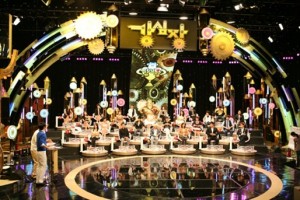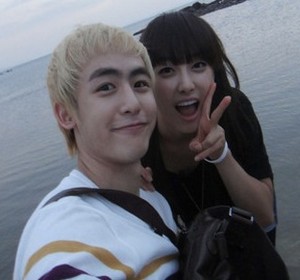 If you’ve been paying attention to the K-pop scene lately, you might have noticed a new (and non-Korean) face on the scene: Thai singer Natthew (Nat Thewphaingam) recently made his Korean debut with the Korean-language song “She’s Bad” (featuring B2ST’s Jun-hyung). Natthew, who was the winner of the fifth season of Thai reality talent show Academy Fantasia, became one of a limited number of non-Korean stars to make a K-pop debut as a solo artist with his performance on M! Countdown. He also made an appearance at MAMA and has expressed interest in expanding his career well beyond Asia. His foray into K-pop marks his first overseas endeavor.
If you’ve been paying attention to the K-pop scene lately, you might have noticed a new (and non-Korean) face on the scene: Thai singer Natthew (Nat Thewphaingam) recently made his Korean debut with the Korean-language song “She’s Bad” (featuring B2ST’s Jun-hyung). Natthew, who was the winner of the fifth season of Thai reality talent show Academy Fantasia, became one of a limited number of non-Korean stars to make a K-pop debut as a solo artist with his performance on M! Countdown. He also made an appearance at MAMA and has expressed interest in expanding his career well beyond Asia. His foray into K-pop marks his first overseas endeavor.
By all appearances, Natthew is not fluent in Korean, but his debut was far from unsuccessful. Though his promotions thus far have been limited, it wouldn’t be hard to mistake him for a Korean on first glance; to the untrained (read: non-Korean) eye, there isn’t much about that debut that looks ostensibly non-K-poppish. From the bleached hair to the costumes to the dancing to the incorporation of English lyrics, Natthew might as well be any other K-pop idol — and given that his performance in Korean wasn’t nearly as bad as was, say, Chad Future‘s, it’s probably fair to say that he could have something of a future working in the K-pop industry — or at least, he’s got as fighting a chance as do most solo singers, who admittedly face an uphill battle from the get-go.
Of course, the presence of non-Koreans in K-pop isn’t exactly new or shocking; a number of groups have foreign members that hail from a few different countries, to the point where adding a foreign member seems to be the trendy and kitschy thing to do when creating a new group. Like Natthew, 2PM prettyboy Nichkhun is Thai, while miss A‘s Fei and Jia, f(x)‘s Victoria, FIESTAR‘s Cao Lu, and former Super Junior member Hangeng all come from China. Also well-represented are the United States and Canada, and a few North American recruits (namely f(x)‘s Amber, Super Junior M‘s Henry and EXO-M‘s Kris) are not of Korean descent. Notably, despite the fact that a large chunk of overseas K-pop promotions take place in Japan, there aren’t nearly as many Japanese members in any currently-promoting group as there are members from the rest of Aisa (with the exception of RaNia‘s Riko [Kim Ju-yeon], a Japanese national, and CROSS GENE’s Takuya); also more or less missing from the scene are Caucasians, and whether or not Asia’s music scene is ready for some Asian-language-speaking Asiaphiles to break down the barriers remains to be seen.
 However, it is rare (to say the least) for a non-Korean artist to strike out on his/her own in South Korea — and it isn’t hard to imagine why others haven’t taken the plunge. While Natthew has proved that a convincing imitation of genuine K-pop can be produced with the right combination of leather pants, an electronic-y song, and pronunciation lessons, it is hard to imagine a non-Korean singer successfully being able to promote based on the merit of his/her music alone because essentially nobody in K-pop actually does this (and the ones who do wind up notably less popular for it). It isn’t really a secret that the K-pop engine often runs more on looks, personality, and charm than it does on music and lyrics; promotions, of course, couldn’t happen without the release of new music, but they also rely heavily on radio shows, variety appearances, and interviews. These sorts of ostensibly non-musical activities are also what buoy idol careers in between promotions. While K-pop hasn’t been unkind or unwelcome to foreign performers, it is true that their lack of experience with the Korean language and culture places them at a disadvantage in terms of successfully carrying out promotions. Entrenching these foreign members in mostly-Korean groups ensures that groups as a whole can engage in promotional activities while buying non-Korean members more time to become familiar with the language and customs of Korean entertainment. For non-Korean members who assimilate (and assimilate well), the pay-off can be enormous; it certainly wouldn’t be going out on a limb to say that Nichkhun is one of 2PM’s most popular members, and it would be similarly ludicrous to say that he and Victoria weren’t a wildly popular couple on We Got Married. Essentially, while K-pop and K-entertainment might not be inherently discriminatory, the system is set up in such a way that those without the proper linguistic skills probably won’t get very far.
However, it is rare (to say the least) for a non-Korean artist to strike out on his/her own in South Korea — and it isn’t hard to imagine why others haven’t taken the plunge. While Natthew has proved that a convincing imitation of genuine K-pop can be produced with the right combination of leather pants, an electronic-y song, and pronunciation lessons, it is hard to imagine a non-Korean singer successfully being able to promote based on the merit of his/her music alone because essentially nobody in K-pop actually does this (and the ones who do wind up notably less popular for it). It isn’t really a secret that the K-pop engine often runs more on looks, personality, and charm than it does on music and lyrics; promotions, of course, couldn’t happen without the release of new music, but they also rely heavily on radio shows, variety appearances, and interviews. These sorts of ostensibly non-musical activities are also what buoy idol careers in between promotions. While K-pop hasn’t been unkind or unwelcome to foreign performers, it is true that their lack of experience with the Korean language and culture places them at a disadvantage in terms of successfully carrying out promotions. Entrenching these foreign members in mostly-Korean groups ensures that groups as a whole can engage in promotional activities while buying non-Korean members more time to become familiar with the language and customs of Korean entertainment. For non-Korean members who assimilate (and assimilate well), the pay-off can be enormous; it certainly wouldn’t be going out on a limb to say that Nichkhun is one of 2PM’s most popular members, and it would be similarly ludicrous to say that he and Victoria weren’t a wildly popular couple on We Got Married. Essentially, while K-pop and K-entertainment might not be inherently discriminatory, the system is set up in such a way that those without the proper linguistic skills probably won’t get very far.
Korean entertainment companies recognize this in their own way. Since the Hallyu Wave first broke, entertainment companies have been dumping  cosmic amounts of money into linguistic training for their idols, and recent years have seen a surge in the number of songs that have been released in Japanese, Chinese, and English. Entertainment companies have also increased efforts at recruiting diversity; while SM Entertainment‘s decision to hold auditions in Kazakhstan, of all places, might have seemed random, it likely reflects a calculated effort to appeal to Central Asian audiences. However, it is worth noting that most (if not all) of these efforts really do not have much to do with ensuring that K-pop sees a fair representation of global cultures on stage. K-pop doesn’t really care that Nichkhun is from Thailand, because when he stands on stage, he is representing the Korean brand; it is true that his ability to communicate in English and Thai is what makes him marketable, but only inasmuch as has linguistic ability furthers the successes of 2PM, a K-pop group that is representing the Korean Wave. Truthfully, it seems as though K-pop will gladly permit the presence of foreign members if it increases the brand’s appeal and marketability to increasingly diverse audiences.
cosmic amounts of money into linguistic training for their idols, and recent years have seen a surge in the number of songs that have been released in Japanese, Chinese, and English. Entertainment companies have also increased efforts at recruiting diversity; while SM Entertainment‘s decision to hold auditions in Kazakhstan, of all places, might have seemed random, it likely reflects a calculated effort to appeal to Central Asian audiences. However, it is worth noting that most (if not all) of these efforts really do not have much to do with ensuring that K-pop sees a fair representation of global cultures on stage. K-pop doesn’t really care that Nichkhun is from Thailand, because when he stands on stage, he is representing the Korean brand; it is true that his ability to communicate in English and Thai is what makes him marketable, but only inasmuch as has linguistic ability furthers the successes of 2PM, a K-pop group that is representing the Korean Wave. Truthfully, it seems as though K-pop will gladly permit the presence of foreign members if it increases the brand’s appeal and marketability to increasingly diverse audiences.
What does that say for stars like Natthew? As mentioned, he’s no doubt doing an impressive imitation of a K-pop star, and as long as his music sells to Korean audiences, he should be able to make returns on his investment in the K-pop scene. However, his position as a solo star jeopardizes his ability to brand himself as a true K-pop star — and while it isn’t totally unprecedented to have foreign stars perform in South Korea, it would be rare for Natthew to enjoy sustained and continued popularity as a K-pop celebrity. Whether or not K-pop is truly ready to accept foreign performers that can’t or won’t represent the Korean Wave as a uniquely Korean brand is up for debate — and stars like Natthew stand poised to call into question K-pop’s openness (or lack thereof) to foreign stars that don’t easily fit into the idol K-pop mold.
What do you think, readers? Are you following Natthew?


